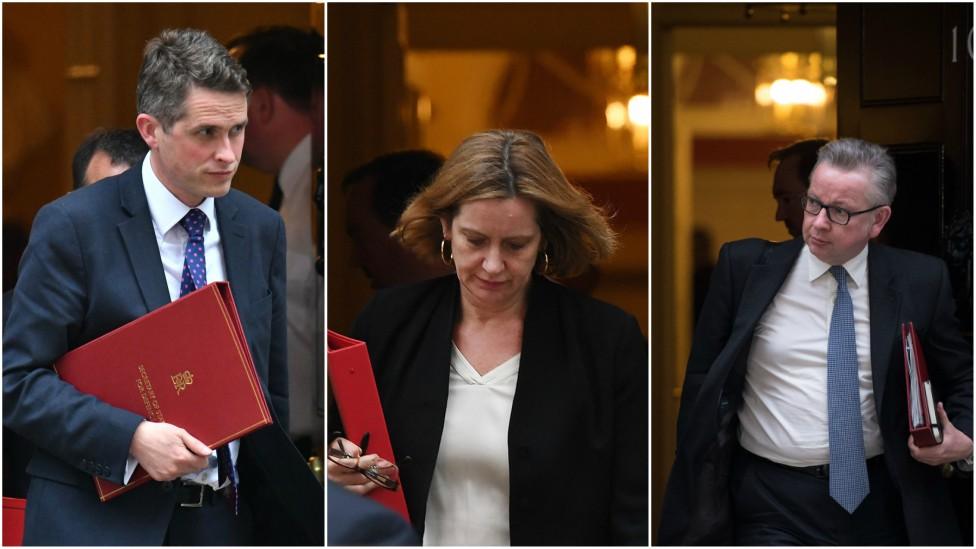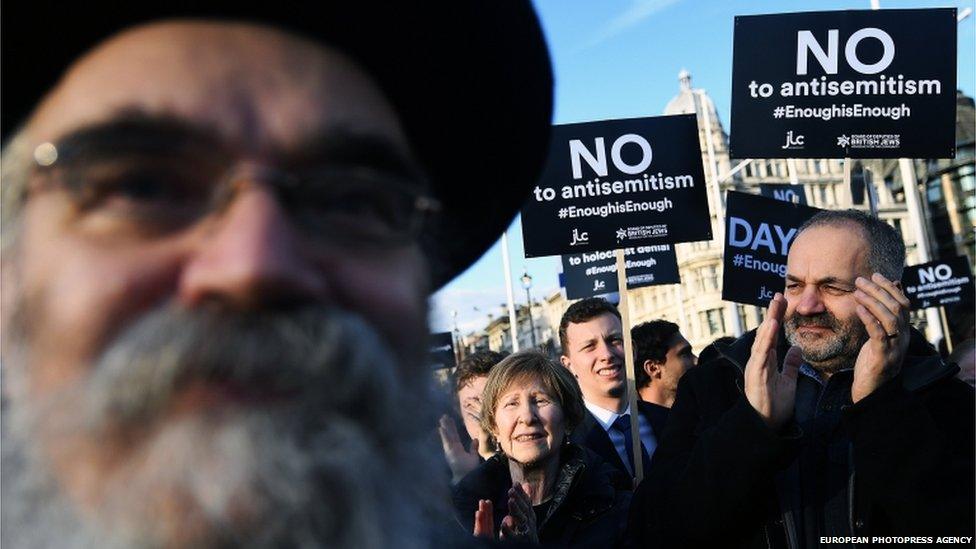Week ahead in Parliament
- Published
- comments

Defence Secretary Gavin Williamson, Home Secretary Amber Rudd and Environment Secretary Michael Gove leave the Cabinet after ministers agreed "on the need to take action" in Syria to "deter the further use of chemical weapons"
Even more than usual, next week's parliamentary agenda looks like a basis for negotiation, with every likelihood that the timetable will have to be reorganised to accommodate a series of major statements and perhaps a full-scale debate on military action in Syria.
As I write, no action has taken place, but one way or another such a debate looks highly likely, because the Opposition will certainly demand one, and this Speaker would surely allow an application for an emergency debate, if only to maintain the precedent of recent years for a parliamentary vote before military action.
So the government might well decide it was not worth having a fight over whether to hold it, when it would probably lose.
And in parallel with those events, the Lords will be voting on what could prove to be highly significant changes to the EU (Withdrawal) Bill.
Amendments are flying thick and fast, and the final deadline for the first Report Stage debate is on Monday, so more will doubtless emerge, external.
The first big vote will probably be on a cross-party amendment to keep the UK in "an arrangement which enables the United Kingdom to continue participating in a customs union with the European Union."
The key point about this amendment is its cross-party backing - its proposers are Lord Kerr of Kinlochard (a crossbencher and former diplomat); Conservative grandee Lord Patten of Barnes; Labour's Brexit spokespeer, Baroness Hayter of Kentish Town and her Lib Dem opposite number Baroness Ludford. The point here is that it is not amendments from a single party that assemble enough support to defeat the government, but grand cross-party coalitions.
This one (and plenty more to come) tick that box, by assembling Tory Europhiles and big-name crossbenchers alongside the opposition parties.
Meanwhile the government does seem to be moving on a series of issues raised by the Lords' highly influential Constitution Committee, external, on such issues as the exact status of retained EU law and the ability of UK courts to consider judgments of the European Court of Justice, post-Brexit.
Ministers have put down their own amendments on these and other issues, and the response from some of their key critics seems favourable. This looks like a smart move, because the Lords were very likely to back amendments from influential constitutionalists, had ministers not moved first - and it signalled a willingness to listen.
With key Brexit measures like the Trade Bill still being held back, the Commons schedule has a series of general debates, on housing, industrial strategy and anti-Semitism.
Up on the committee corridor the Digital, Culture, Media and Sport Committee has two more instalments of its Fake News inquiry - including, on Wednesday, the recall of Cambridge Analytica boss Alexander Nix.
Here's my rundown of the week ahead:
Monday
The Commons resumes at 2.30pm - where the opening event is Home Office questions.
After that expect any number of post-recess statements and urgent questions. With Home Secretary Amber Rudd already in the chamber, it might be a good moment to raise the upsurge of knife crime in London, for example.
The day's legislating is on the second reading of the almost completely uncontroversial Laser Misuse (Vehicles) Bill, external - which makes it a specific offence to shine a laser into the eyes of a driver or pilot.
This, and the ensuing general debate on Housing and Homes, look eminently postpone-able, if there is more urgent business to discuss. If it goes ahead, the housing debate will provide ministers with an opportunity to highlight what they see as a policy success in increasing new home starts, and for Labour to fire back on homelessness and a lack of social housing and affordable housing.
It will also be a test for the new Housing Minister, Dominic Raab, who has been catapulted into a sensitive policy brief from his previous berth as a Brexit minister - and he will be up against Labour's Jon Healey, who is an experienced former housing minister.
The day ends with an interesting looking adjournment debate, led by up-and-coming Conservative lawyer Alex Chalk, on the effect of cyber-bullying on young people's mental health.
He called this debate publishing a report with Young Minds and The Children's Society, external, with evidence from over 1,000 young people, plus experts and representatives from the social media giants. He says it's clear that cyber bullying wrecks lives and has a toxic effect on adolescent mental health, and that the issue needs to be tackled robustly.

In Westminster Hall (4.30pm), the Petitions Committee has scheduled a debate on a series of petitions, external on human rights abuses against the Muslim Rohingya people, by the security forces in Myanmar's Rakhine State, which has resulted in a humanitarian crisis as refugees pour into neighbouring Bangladesh.
MPs will debate e-petition 200224: "impose harsh financial sanctions on the State of Myanmar due to the current ongoing ethnic cleansing being pursued by elements of its security forces," which attracted 30,349 signatures, and e-petition 200371, which says: "Hundreds have been forced to flee their villages as the emergency situation in Myanmar has worsened. Urgent needs of displaced people include water, hygiene facilities, food & shelter," which was signed by 1,451 people, as well as a series of related public petitions.
In the Lords (2.30pm) peers will rattle through a series of orders and regulations before debating a motion to approve, for the purposes of Section 5 of the European Communities (Amendment) Act 1993, the government's assessment of the medium term economic and fiscal position.
They will also have a short debate on developing a sustainable lifelong learning culture in England, led by the Lib Dem,Baroness Garden of Frognal.
Tuesday
The Commons opens (11.30 am) with Treasury questions, with the probability of more urgent questions or ministerial statements to come at 12.30pm.
Conservative MP Bim Afolami has a ten minute rule motion on drug testing in prisons, and then comes a general debate on anti-Semitism.

This addresses a painful and politically radioactive issue - and the word is that so many MPs have already put down to speak, that speeches will be kept very short. Communities Secretary Sajid Javid opens for the government, with Andrew Gwynne leading for Labour - and there will be considerable interest in whether Jeremy Corby attends, or speaks. The debate was chosen by the government, and there will doubtless be attempts to maximise Labour's divisions, after the events of recent weeks.
Next comes a debate chosen by the Backbench Business Committee, on a motion calling for redress for victims of banking misconduct - the particular focus is the report into the conduct of the RBS Global Restructuring Group (GRG) and the issues it raises about the strength and independence of the Financial Conduct Authority; the motion calls for further inquiries into RBS GRG by a body independent to the FCA - and an independent inquiry into the financial services sector.
In Westminster Hall, the subjects for debate include: reducing fly-tipping (9.30am-11am) led by the chair of the Environment Food and Rural Affairs Committee, Neil Parish; health services in Essex (11am-11.30am) led by the former Cabinet minister, Priti Patel; the effect of the UK leaving the EU on tourism and the creative industries (2.30pm) led by Lib Dem Christine Jardine; the sale of energy drinks to children (4pm) led by Labour's Anna Turley, and future trade remedies after the UK leaves the EU (4.30pm) led by the Conservative, Jack Brereton.
On the committee corridor, the Justice Committee winds up its inquiry into Transforming Rehabilitation with evidence from Dame Glenys Stacey, HM Chief Inspector of Probation, and the prisons minister, Rory Stewart (10am).
And the Digital, Culture, Media and Sport Committee continues its Fake News inquiry with evidence from Brittany Kaiser, former Director of Program Development, at Cambridge Analytica (10.30 am).
In the Lords (2.30 pm) questions to ministers include the Conservative historian, Lord Lexden, on an independent inquiry into Operation Conifer - the two-year, million-pound Wiltshire police inquiry, into allegations of rape and sexual assault against the former prime minister, the late Sir Edward Heath.
The day's main legislating is on the report stage of the Haulage Permits and Trailer Registration Bill - a mini-Brexit bill designed to provide a framework for the haulage industry, post Brexit.
Labour's Lord Kennedy of Southwark has a regret motion down against the Housing and Planning Act 2016 (Database of Rogue Landlords and Property Agents) Regulations 2018 - which provides a list of bad landlords.
His complaint, harking back to the 2016 Housing and Planning Act, is that it can only be accessed by local councils and public bodies, and is not available for prospective tenants to check out their landlords. His motion is backed by the Lib Dems and the government has been attempting to head off possible defeat with an "All Peers" letter saying it is looking at ways to give tenants access.
And finally, there's a short debate on addressing obesity among children and young people.
Wednesday
The Commons opens (11.30am) with half an hour of International Development questions, followed at noon by PMQs.
The day's Ten Minute Rule Bill, from Labour's Steve McCabe, is on access to fertility services including requiring that a minimum number of fertility treatments are available to women on the basis of their age.
MPs then polish off the committee and third reading stages of the Laser Misuse (Vehicles) Bill, before moving on to another general debate - this time on industrial strategy.
The day's Westminster Hall debates are on the work of the Council of Europe (9.30am) led by Labour's Vernon Coaker; the effect of the UK leaving the EU on the veterinary profession in Wales (11am) led by Plaid Cymru's Ben Lake; the future of the UK digital and tech industries (2.30pm) led by the Conservative Anne Main; REAF the Renaissance for East Anglian Fishing campaign (4pm) led by Conservative Peter Aldous, and austerity and changes in life expectancy (4.30pm) led by Labour's Louise Haigh.
My committee corridor picks are the Environment, Food and Rural Affairs hearing on the fur trade in the UK (9.30am) with witnesses from Amazon, Not On The High Street, Fur Europe, the British Fur Trade Association, and the International Fur Federation.
And watch out for the second Fake News hearing from the Digital Culture Media and Sport Committee, with the recalled witness, Alexander Nix of Cambridge Analytica.
In the Lords (3pm), questions to ministers include the Lib Dem, Lord Tyler, asking whether current electoral law adequately prevents the misuse of personal data in UK elections and referendum campaigns.
Lords stake out positions on Brexit bill, at the start of the bill's progress
And then it's showtime - the first report stage debate on the European Union (Withdrawal) Bill - with the prospect of actual votes and the distinct possibility of a government defeat on the cross party amendment on "a" customs union.
One point to watch out for is the scale of any anti-government majority; the ultimate aim of these votes is to set up an opportunity for the government to be defeated in the Commons - so a big majority in the Lords provides a bit of psychological reinforcement for wavering Conservative MPs.
On the long-established principle that in the Lords, much depends on dinner, expect the big votes to be held between about 4.30pm and 7.30pm.
I don't often highlight Lords Select Committees, but the Constitution Committee hearing (9.45am) on Parliament's role in relation to the terms of Brexit, with Brexit minister Steve Baker and Suella Braverman (formerly Fernandes) could provide quite an interesting appetiser for the debates in the main chamber.
Essentially they will be looking at what kind of leverage the various possible parliamentary votes on Brexit could exert on the policy of the government.
For example, will the much-touted "meaningful vote" be a choice between accepting the withdrawal agreement in full, or leaving the EU without any deal? What might happen if Parliament approved the withdrawal deal, but rejected the political declaration on the framework for a future UK-EU relationship? How long would MPs and peers get to study the agreements before being asked to vote on them and will the government publish an impact analysis?
All big important procedural questions which will shape the vital debates due in the autumn.
Some of these issues have been raised in written questions by crossbench peer Viscount Waverley, external - and the response has been some pretty straight batted non-answers. Will the two ministers go further? This is not a committee that responds well to stonewalling...
Thursday
The Commons convenes at 9.30am for Transport questions, followed at 10.30am by the weekly Business Statement from the Leader of the House, Andrea Leadsom.
And then, assuming no further ministerial statements or urgent questions, it is on to a series of backbench business debates.
First, there is a motion on surgical mesh, backing the decision to hold a retrospective audit of its use to treat pelvic organ prolapse and stress urinary incontinence and calling on the government to suspend prolapse and incontinence mesh operations while the audit is carried out - and to commit to a full public inquiry into mesh if the audit suggests that this is the best course of action.
Then MPs turn to a motion on cancer treatment mirroring the very powerful debate led by Tessa Jowell in the House of Lords in January.
Baroness Jowell was diagnosed with a brain tumour last May and has been campaigning for improvements to treatment, patient care, and clinical trials. The motion proposed by Labour's Sarah Jones pays tribute to her work recognises the government's increased funding for research and calls on the government to increase the sharing of health data and promote greater use of adaptive clinical trials.
In the Lords (11am) peers debate the detail of the Registration of Marriage Bill, external which reforms the way in which marriages are registered in England and Wales, moving from a paper-based system to registration in an electronic register. Among other things, it will allow the inclusion of each spouses' mother in the marriage entry.
Then peers debate the report from the committee on the Long-term Sustainability of the NHS, external - which found that "a culture of short-termism seems to prevail in the NHS and adult social care".
It argued that the Department of Health and almost everyone involved in the health service and social care system were absorbed by the day-to-day struggles, leaving the future to "take care of itself".
The report called for a new political consensus on the future of the health and care system based on government-initiated cross-party talks and a robust national conversation. Peers will also debate a report from the EU External Affairs Committee: Brexit: sanctions policy, external.
Neither House sits on Friday 20 April.